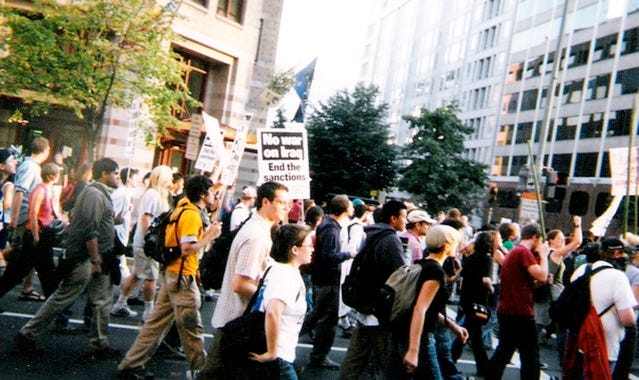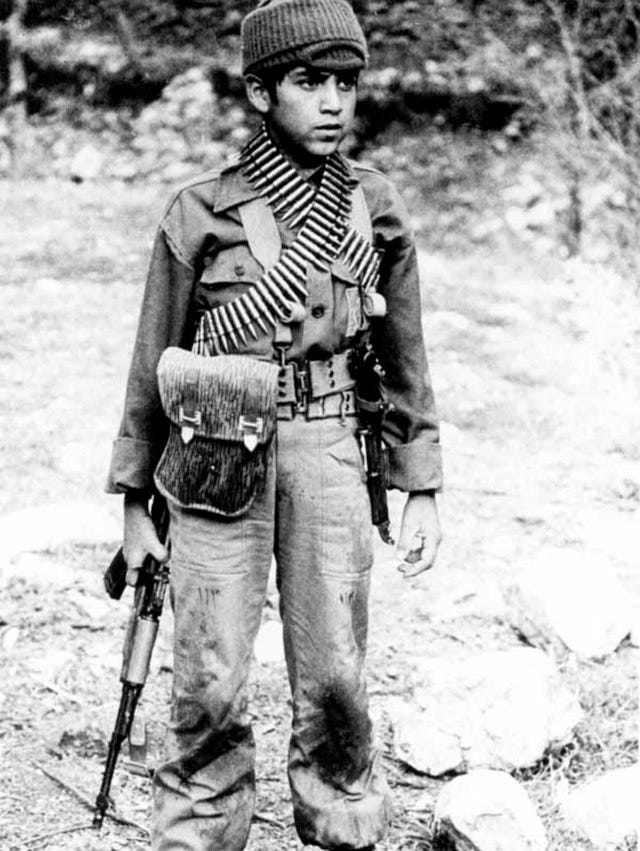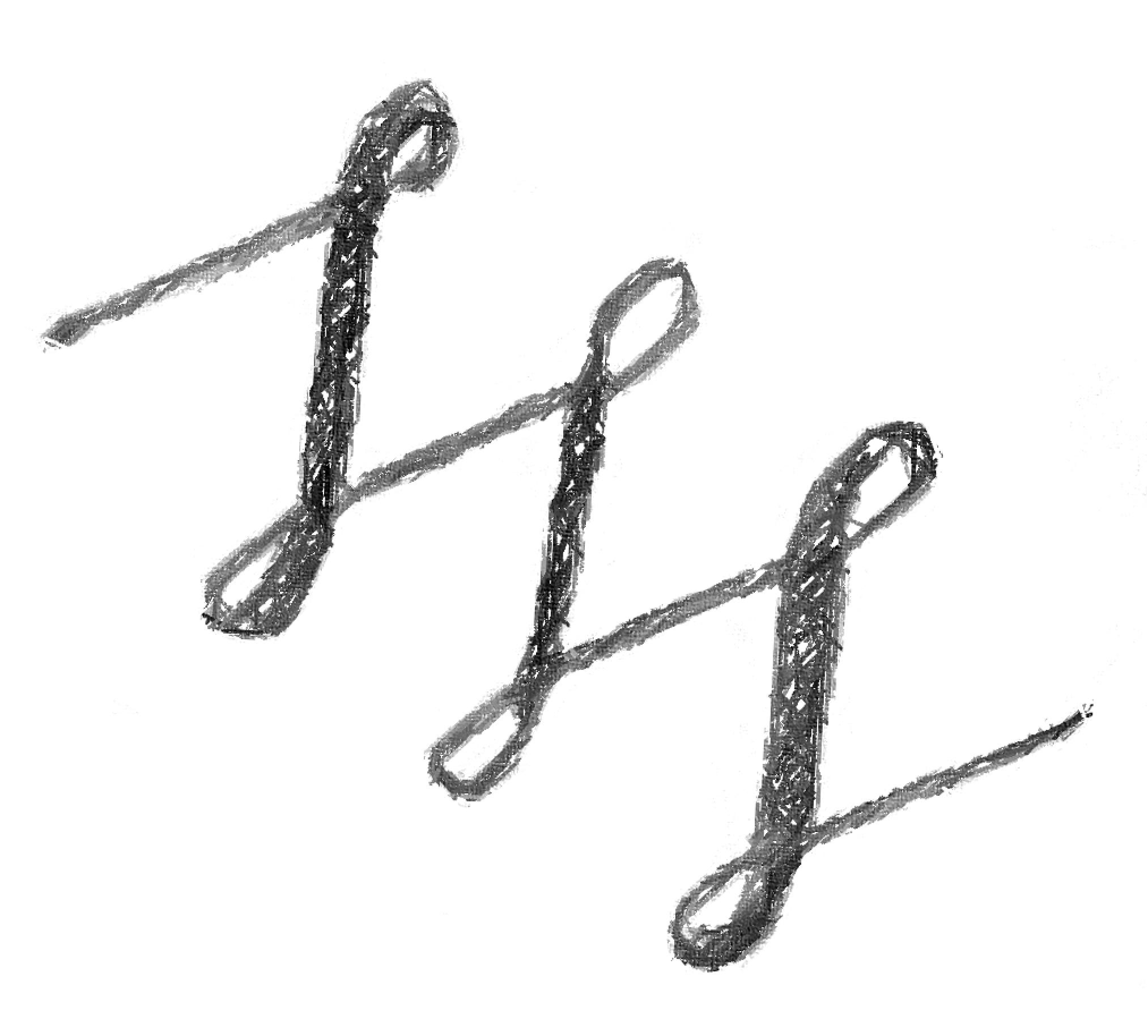Hi all,
Thank you for joining me for this week’s song, “Is It for Freedom?”, by Sara Thomsen, from the album, Fertile Ground (1999). If you’d like to hear the song before you read the background, I’ve included a YouTube video below the article. Below, you’ll find my interpretation of the lyrics (written in italics). Comments and questions are welcome.
✳️ Note: The level of this article is for students with a TOEIC of 550+, Eiken Pre-1, CEFR B2. For Japanese students, vocabulary words in bold are provided in Japanese below.
(680 words)
The writer of today’s song, Sara Thomsen, writes the following on her website:
This song was written in response to hearing the stories told by U.S. citizens who travelled to Iraq to bring food and medicine and bear witness to the suffering sustained by our foreign policy. At the time of this song’s writing (1999), there were 5,000 to 6,000 children dying each month as a direct result of UN/US imposed economic sanctions. What is worth the cost of these children dying? The song remains a protest of war and questions our rationale for its engagement.
.
The Background
Iraq and Iran were at war for almost 8 years, from 1980 to 1988. There were border disputes and disagreement over which groups should rule the two countries. The war was devastating for both countries. In the end, around half a million people were killed, economies destroyed, and neither country had taken any new territory.
Then, in 1990, the Iraqi government invaded Kuwait in 1990. Iraq said Kuwait was making too much oil, which made the price of oil go down. Iraq was already suffering from the Iran-Iraq War and needed a good price for its oil.
Many people and countries didn’t like Iraq’s invasion of Kuwait because it broke the rule of letting each country make its own choices. They also thought Iraq should have talked more before using force. People worried that Iraq’s actions could cause more problems in the Middle East and make things unstable.
The United States used the UN Security Council’s approval to impose harsh sanctions on Iraq that caused great suffering. People couldn’t get enough food or medicine, leading to hunger, sickness, and even death.

The Song
Rulers of the nations as you fuss and fight
Over who owns this or that and who has the right
To design, build, sell and store and fire
All the bombs and guns to defend your holy empire
.
There are children hungry, children sick and dying
There are mothers, fathers, sisters, brothers crying
They’re only pawns in your play of power and corruption
Slowly starve them, your new weapon of mass destruction
The songwriter is asking us, and Americans in particular, what we value most. She is asking us to take responsibility for the deaths that the sanctions have led to.
And prove to me, America, that you care
And prove to me, America, you’re aware
Who’s dying for your freedom in this land
Who pays the cost for the liberties you demand
.
Is it for freedom, or our comfort and convenience
Is it to profit for big business we pledge our allegiance
Are we prisoners in the land of the brave and the bold?
Held by indifference or hearts grown hard and cold
“Pledging allegiance” usually means that you promise to be loyal to your country. Here, the question is, are we more loyal to having convenient lives? The brave and the bold refers to the United States. It was also the title of an animated television series in 1999 in which several superheroes fight together to overcome the villains. There is an ironic metaphor here of the “good guys” (the U.S. and its allies) versus the “bad guys” (countries such as Iraq that invade other countries).
Children of the world, you have the right
To sing and dance, run and play, let your dreams take flight
As the innocent die you rulers carry the shame
And if we stand idly by we share in the blame
The songwriter is accusing the countries’ leaders of the heartless act of imposing the sanctions that led to deaths, especially of children.
To stand idly by means to not take action when you see someone doing something that is wrong. To be idle means to not move.
And oh, America, do we care
Oh, America, are we aware
Who’s dying for our comfort in this land
Who pays the cost for the convenience we demand?
.
Children of the world, you have the right
To sing and dance, run and play, let your dreams take flight
.
Is It For Freedom? asks some very important questions. Our answers reflect our humanity.
Question
The lyrics talk about “convenience”. What kinds of convenience do we demand in our daily lives? Do you think it’s worth the cost of human life?
VOCABULARY
bear witness to ~について証言する
suffer 苦しむ
sustain 持続する
foreign policy 外交政策
impose 課す
economic sanctions 経済制裁
rationale 理論的根拠
engagement 会戦
devastating 壊滅的な
territory 地域
invade 侵入する
unstable 不安定
harsh ひどい
fuss 大騒ぎ
empire 帝国
pawns ポーン
corruption 腐敗
starve 飢える
weapon of mass destruction 大量破壊兵器
pay the cost 費用を支払う
liberties 自由
prisoner 囚人
indifference 無関心
overcome 克服する
villain 悪党
innocent 無実の
shame 恥
blame 非難
accuse 責める
humanity 人情
SOURCES
Halliday, D. (1999). The Impact of the UN Sanctions on the People of Iraq. Journal of Palestine Studies, Vol. 28, No. 2 (Winter, 1999), pp. 29-37. University of California Press on behalf of the Institute for Palestine Studies. http://www.jstor.org/stable/2537932 Accessed 28 January 2024.
International Committee of the Red Cross. (1999, December 14). Iraq: 1989-1999, a decade of sanctions. https://www.icrc.org/en/doc/resources/documents/report/57jqap.htm. Accessed 28 January 2024.
Sara Thomsen’s website:








You are right, we stand idly by.
Interesting... A perspective not mentioned in the song is how the sanctions are intended to work. The idea is those countries being sanctioned are meant to, and able to, avoid major economic pain and human suffering by changing their own policies and behaviors. Instead the leadership lets their own people suffer to maintain their power, or financial greed. Any uprising by citizens is put down, or met with worse conditions. I'm sure there are songs about that, too.